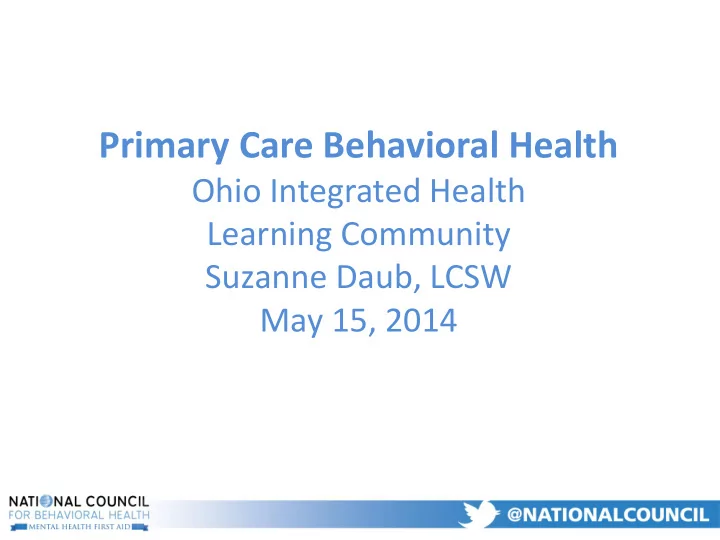

Primary Care Behavioral Health Ohio Integrated Health Learning Community Suzanne Daub, LCSW May 15, 2014
What is Behavioral Health Integration?
The Primary Care Behavioral Health (PCBH) Model At the simplest level, integrated behavioral and physical health care occurs when behavioral and primary care providers work together to address the physical and behavioral health needs of their patients.
A Standard Framework For Describing Integrated Health Services
Integrating Behavioral Health and Primary Care: Behavioral Health Consultation
PCBH and Role of Primary Care Provider Serves as team leader Screens for depression, anxiety and trauma Refers a broad range of patients to behavioral health Uses behavioral health consistently at certain types of visits (chronic pain, initial dx of diabetes, well child visits, etc.) Conducts medication evaluation, prescribing, and monitoring
PCBH and Role of Behavioral Health Work alongside primary care providers as Behavioral Health Consultants (BHCs) Immediately accessible for both curbside and in-exam room consults, same-day visits (15 – 30 minute consults between 7 – 10/day) Shared records: chart in the medical record using a Subjective, Objective, Assessment, and Plan (SOAP) note format Reimbursement by encounter – not by time No office, No caseload, No “no shows” Robinson, P.J. and Reiter, J.T. (2007). Behavioral Consultation and Primary Care (pp 1-16). N.Y.: Springer Science + Business Media.
Clinical Approach of Behavioral Health Consultant Problem-focused and functional-contextual approach to assessment and treatment of behavioral health disorders Use evidence-based instruments to develop treatment plans, monitor patient progress, and flexibly provide care to meet patient’s changing needs: Motivational Interviewing 1. Behavioral Activation 2. Acceptance and Commitment Therapy 3. Screening, Brief Intervention, and Referral to 4. Treatment (SBIRT) Robinson, P.J. and Reiter, J.T. (2007). Behavioral Consultation and Primary Care (pp 1-16). N.Y.: Springer Science + Business Media.
Role of the Behavioral Health Consultant Address a variety of issues common to primary care: Affective concerns: depression; anxiety Response to physical illness; pain; substance use and abuse Health behavior change: obesity, smoking, sleep, medication adherence, self management of chronic conditions Engage in prevention activities Hunter, C.L., Goodie, J.L., Oordt, M.S., & Dobmeyer A.C., (2009), Integrated behavioral health in primary care: Step-by-step guidance for assessment and intervention. Washington, DC: American Psychological Association
PCBH − Collaborative Approach PCPs systematically screen and do “warm hand - offs” according to patient needs PCPs and BHCs regularly review each other’s notes in the Electronic Medical Record Regularly consult about patient care and change or adjust treatments if patients do not meet treatment targets Co-monitor treatment response at each contact with valid outcome measures Patients who are not improving are identified and targeted for move to a higher level of care
Case Example Ms. T is a 73 year old African American woman. She is a retired teacher with chronic back pain, hypertension, and a history of multiple hospitalizations for coronary artery disease. She is depressed, has stopped going to church, misses her PCP appointments, and takes her HBP medications “on her own terms.”
To work in integrated care settings… Basic understanding of primary care medical conditions Screening, rapid assessment and brief intervention Motivational interviewing, behavioral activation, self management Systems oriented practice including care planning and care coordination Primary care communication skills and interdisciplinary care Working knowledge of psychopharmacology Substance use/addiction treatment (Source: /Forthcoming/ Annapolis Coalition on Behavioral Health Workforce White Paper, “Core Competencies for Integrated Be havioral Health and Primary Care“)
Questions
Resources SAMHSA/HRSA Center for Integrated Health Solutions (CIHS) Field-based & Research-based Materials Council on Social Work Education (CSWE) Free Integrated Health Social Work Curriculums Integrated Care Resource Center (ICRC) Medicaid State Level Tech. Asst. for Integrated Health AHRQ Academy for Integrating Behavioral Health & Primary Care Great Research-based Resources Dear State Medicaid Letters/Centers for Medicaid & Medicare Services (CMS) Variety of IH Directives including: Health Home Core Quality Measures
Resources Clinical Social Work & Behavioral Medicine Certificate Program http://www.bu.edu/academics/ssw/programs/clinical-social-work-and-behavioral- medicine-certificate-program/ University of Michigan Certificate in Integrated Health http://ssw.umich.edu/offices/continuing-education/certificate-courses/integrated- behavioral-health-and-primary-care University of Massachusetts Two Certificate Programs in Integrated Health http://www.umassmed.edu/cipc/ Fairleigh Dickinson University Certificate in Integrated Primary Care http://integratedcare.fdu.edu/ Arizona State University Doctor of Behavioral Health http://asuonline.asu.edu/dbh
Recommend
More recommend